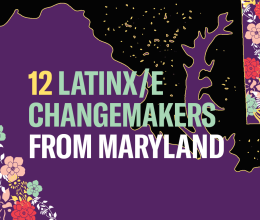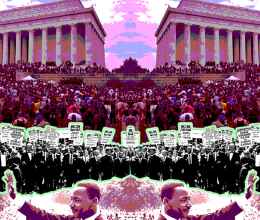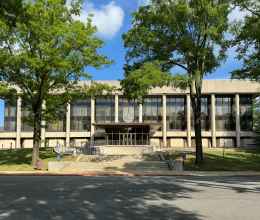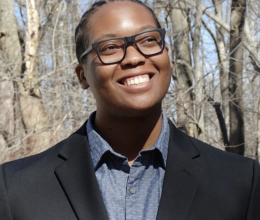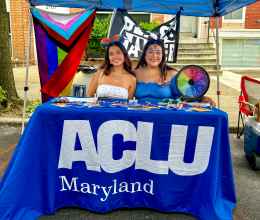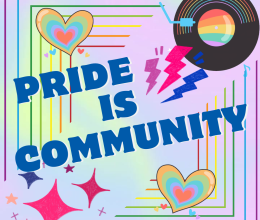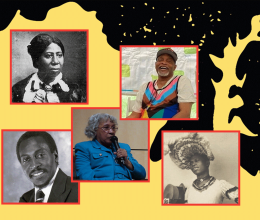

I’m a woman
Phenomenally.
Phenomenal woman,
That’s me.
-Maya Angelou
More important and fascinating women are newly added to the latest edition of our Women’s History heroes celebration blog this year! The beauty and power of womanhood is that while it is uniquely ubiquitous, it is somehow still indescribable. Strong, kind, unapologetic, brilliant, brave, relentless – being a woman is a vast, colorful, multi-faceted experience that truly knows no bounds. This Women’s History Month, and every day, we are celebrating all women and highlighting diverse changemakers from the great state of Maryland. In total, here are 39 of those phenomenal women. New additions are at the top!
We are creating an archive of inspriring women in Maryland history. Is there a historical Marylander who isn't already on our list?

-
Anna Murray Douglas (1813–1882)
Born on the Eastern Shore of Maryland, Anna Murray Douglass was abolitionist and member of the Underground Railroad. Unlike many enslaved men, women and children of the time, Anna was born free as her parents were released in Denton, Maryland just before she was born. Anna was incredibly resourceful and at the age of around 17 she left her family to find work where she eventually met Frederick Douglass around 1838, the same year he had escaped slavery. The support and encourage that Frederick received from Anna who was born free, played a pivotal role in his own possibilities and eventual success. The two married and had five children within their first ten years of marriage. When the family relocated to Rochester New York, Anna created a headquarters for the Underground Railroad, providing clothes, food, and shelter for enslaved people on their way to Canada. Anna’s daughter Rosetta often reminded people who looked up to her father that his “was a story made possible by the unswerving loyalty of Anna Murray.”
- Helena Hicks (1943–2024)
Often recognized as the lead organizer of the lunch counter sit-ins at Read’s Drug Stores in Baltimore, Helena Hicks was a prominent civil rights advocate and voice for justice. Born on June 28, 1934, on Presstman St. in Baltimore, Hicks earned a Bachelor of Science in sociology at Morgan State, her M.S.W in Public Welfare and Psychiatric Counseling from Howard University in 1960, and later her PhD in Public Policy from the University of Maryland. While her academic achievements were beyond impressive Dr. Hicks is most known for the events that took place while she was a student at Morgan State University in January 1955. She along with five other students participated in a lunch counter sit-in at white only Read’s Drug Stores in Baltimore. It was among the first successful student led protests to which eventually led to desegregated lunch counters. Dr. Hicks went on to author several publications, taught courses at the University of Baltimore and Baltimore City and helped produce content for PBS on family daycare.
- Vivian Mildred Bailey (1918–2022)
Washington D.C. native Vivian Bailey was born on February 3, 1918. “Millie” as she as affectionally known, entered the Women's Army Auxiliary Corps, later known as the Women's Army Corps, in December 1942 and served faithfully until January 1946 when she was honorably discharged with a host of medals and military recognitions. In 1970, she and her husband Bill moved to Columbia, Maryland where the two thrived and gave back tirelessly to the Howard County community. Among her countless honors, she received Towson University’s Distinguished Black Marylanders Award, Maryland’s Top 100 Women, Maryland State Governor’s Citations for her lifelong contributions, a Congressional Achievement for her many years of public service from the late Congressman Elijah Cummings, and the President's Lifetime Achievement Award for lifelong commitment to building a stronger nation through volunteer service. In October 2020, the Vivian Bailey Neighborhood Square on Lake Kittamaqundi in Columbia, Maryland was dedicated to her.
- Mother Mary Elizabeth Lange (1789–1882)
Born Elizabeth Clarisse Lange in Saint Domingue in 1789, and later known as Mother Mary Elizabeth Lange, Lange was the founder of the first Black religious congregation in the United States. The daughter of refugees who fled to Cuba, Elizabeth excelled in Santiago where she received a good education before leaving in the early 1800s to the United States. She landed in a couple American cities, including Charleston and Norfolk before settling in Baltimore. The city had a number of free people of color, including many who had also fled from parts of the Caribbean, but there were not many schools to attend for the growing population. Lange fulfilled this need by opening a school in her home in Fells Point. Later, she along with Sulpicians priest James Nicholas Joubert founded the Oblate Sisters of Providence, the first religious congregation of women of African ancestry in the country. Eventually, Lange was named “Sister Mary” and appointed the first superior general of the new Catholic community. In 1991 she was inducted into the Maryland Women’s Hall of Fame and the Oblate Sisters of Providence continues to thrive in several foreign countries.
- Estelle Anna Lewis (1824–1880)
Estelle Anna Lewis was a 19th century writer, poet, and dramatist. She was born in April 1824 near Baltimore, Maryland and died on November 24, 1880. Lewis was the daughter of John Robinson who was from Cuba and had English and Spanish descent. In school, she studied law, history, comparative literature, and classical and modern languages. At fourteen, she published her first poem. At twenty, she published her first book. Lewis continued writing many volumes of poetry and plays thereafter. In many of her works, she creates extremely complex and thought-provoking characters. Lewis’ writing greatly influenced American literature and culture.
- Anna Georgette Crothers (1867–1954)
Born in Cecil County, Maryland, Dr. Anna Georgette Crothers was one of the first female dentists in the state of Maryland, graduating from the Philadelphia College of Dentistry, Class of 1899. She was one of eight children, four boys and four girls, born to the Crothers family, and three of her brothers were also involved in the medical/health sciences field. After graduating from dental school, Dr. Crothers set up her office in her parents’ home, Graystone Farm. She practiced dentistry until 1914.
- Nina Rosita Harper (1959–2018)
Nina Rosita Harper was born in 1959 in Baltimore, Maryland. Sadly, she passed away in 2018, but leaves behind a long-lasting legacy. She launched her political career in the 1980s and served in the Maryland General Assembly representing District 45 in Baltimore City. Harper was known for building organizations and movements up so that they would succeed. She grew up in East Baltimore and was raised by Geneve Mello Himan and Andres Himan, who was from the country of Colombia. Not only was she a politician, but she was also a writer whose work was published in the Catholic Review. She was awarded the Mother Mary Lange Award and the Unsung Black Catholic Woman Award. Her community activism, organizing, and persistence touched the lives of many and made significant contributions for Maryland.
- Victorine Q. Adams (1912–2006)
Born on April 28, 1912, Victorine Quille Adams was the first Black woman to serve on the Baltimore City Council. Adams began her trailblazing efforts as a teacher in the segregated Baltimore Public School system. She was a graduate of Frederick Douglass High School and Morgan State College (University). In 1943 she become one of five women who chartered the National Council of Negro Women in Baltimore and three years later founded the Colored Women’s Democratic Campaign Committee, encouraging Black women to register to vote and run for public office. In 1966 she did just that, running for Maryland’s House of Delegates successfully until she resigned after winning a seat on the Baltimore City Council. Among her many accomplishments, Adams was the owner of a clothing store for women, the Charm Center, co-founder of Woman Power, Inc., and taught a six-week course called Project Beauty and Charm which taught women and girls how to improve their charm, grace, and self-esteem.
- Enez Grubb (1942–2018)
The woman who would later co-chair the Cambridge Nonviolent Action Committee was born on December 18, 1942, in Cambridge, Maryland. Enez Grubb dedicated her life to Christ at an early age and was eventually ordained as Reverend, serving many churches in Maryland including the African Methodist Episcopal Church and Union Chapel AME Church. Rev. Grubb was a graduate of Mace Lane High School and Sojourner-Douglass College, where she received her Bachelor of Arts and served in the United States Reserve for 16 years. At the age of 19 she led many marches in downtown Cambridge, conducted sit-ins at lunch counters that refused to serve Black people, and picketed businesses that refused to hire Black people. Her leadership challenging racially discriminatory policies was essential to the integration of the City of Cambridge Rescue Fire Department and the Cambridge Arena Pool. Rev. Grubb served as Vice President of the Harriet Tubman Coalition, a member of the Good Shephard Society, and the Cambridge Housing Review Board and Director of Sojourner-Douglass College, her alma mater.
- Mamie B. Todd (1916–2022)
The granddaughter of people who were enslaved, Mamie Bland Todd was born in 1916 in Dinwiddie, Virginia who grew up to be an innovator for Maryland. Todd took her teaching skills, instilled in her by her grandfather and hero, Edward D. Bland, and expanded upon them at Virginia State College (University) where she joined Delta Sigma Theta Sorority, Inc., and the University of Pennsylvania. In 1941 she left Virginia and moved to Baltimore where she began working in childcare services, volunteering in her community, and organizing with the NAACP. Throughout her esteemed work, Todd’s commitment to children was clear as she led the development of the State of Maryland’s Social Services Administration’s Child Protective Services Agency – with the goal of ensuring that those who abused children were investigated and that abused children received proper therapeutic treatment. Todd also helped establish the University of Maryland School of Social Work, which made Maryland one of the first states to establish undergraduate social work programs. She lived to be 105 years old.
- Harriet Elizabeth Brown (1907–2009)
Born February 10, 1907, in Baltimore, Harriet Elizabeth Brown was a Calvert County school teacher who advocated for equal pay for Black teachers. She had a great impact on teaching and the educational world. After learning white teachers made twice the pay of Black teachers, she went on to bring a lawsuit with the help of the NAACP Legal Defense and Educational Fund, Inc. attorney Thurgood Marshall, suing the Calvert County Board of Education so that all teachers are paid equal, regardless of race. This case paved the way for Maryland Teachers Pay Equalization Law. Harriet Elizabeth Brown was truly a pioneer for civil rights.
- Florence Riefle Bahr (1909–1998)
Born February 2, 1909, in Baltimore, Florence Riefle Bahr was an artist and activist. She portrayed significant moments of history in her paintings. Bahr supported civil and human rights and used her artistic talents to make a record of historic events, like Martin Luther King Jr.’s Washington D.C. “I Have a Dream” speech. She became involved in causes like the Black Panther Party breakfast programs, women’s rights, and anti-war efforts. She strongly believed in getting involved politically to make changes to Maryland. In 1999, she was inducted into the State of Maryland’s Women’s Hall of Fame.
- Sarah Collins Fernandis (1863–1951)
Born March 8, 1863 in Port Deposit, Maryland, Sarah Collins Fernandis was a social worker, writer, and community leader based in Baltimore. After receiving her Master of Social Work from New York University, she opened the first Black social settlement house in Washington D.C. Social settlement houses were organizations that provided support services for the community. Fernandis went on to establish more houses and resources for the community like a daycare, library, funds, classes and training, playgrounds, and more opportunities. She lectured and wrote articles, advocating for her community’s wellbeing and resources. In 1913, she founded a group of Black women, called the Cooperative Civic League, which corresponded to the Women’s Civic League. Together, they cleaned neighborhoods and brought nutritional food for children. She was a civil rights writer and poet as well, who brought to light the plight of Black workers. Sarah Collins Fernandis is remembered as a pioneer who fought tirelessly for the rights of the Black community.
- Grace Snively (1913–2014)
Born July 29, 1913 in West Virginia, Grace Snively moved to Maryland and became a community activist here. She was a medical educator, as well as a civil rights and voting rights activist. In the segregated neighborhoods of Maryland, Grace Snively championed for gynecological healthcare with a focus on early cancer detection. She went door to door to hand out Pap smear tests and educate her community about cancer. She especially strived to give Women of Color more information about cancer detection and reproductive health. Not only did she advocate for her community’s health, but she also advocated for voting rights of Black people. Her activism led to her being appointed as a Washington County Election Board judge, and then after thirty years became a chief judge. Volunteering for the community was another substantial part of her life. Grace Snively served on the boards of the American Red Cross and Community Action Council. She was a United Way liaison to the Salvation Army, Boy Scouts, Red Cross and Day Nursery. She served as a state president of the Daughters of Elk. Among the honors she received was being recognized as one of the Top Ten Lady Leaders in the Tri-State area in 1998; being awarded the Governor’s Volunteer Award in 1999; and being inducted into the Maryland Senior Citizens Hall of Fame in 1999.
- Amanda Smith (1837–1915)
Born January 23, 1837 in Long Green, Maryland, Amanda Smith was a minister, missionary, and child advocate. She is famous for the creation of the Amanda Smith Orphanage and Industrial Home for Abandoned and Destitute Colored Children. Born into enslavement, Smith served as an evangelist and leader of the Wesleyan Holiness Movement. Her work led her to preach in several countries including Sierra Leone, Great Britain, and Liberia. In 1893, Smith published her autobiography, The Story of the Lord's Dealings with Mrs. Amanda Smith the Colored Evangelist.
- Sarah V. Jones (Early–Late 1900s)
Born in the early 1900s in Maryland, Sarah V. Jones was a Black woman living and working during the time of Jim Crow. Her commitment to higher learning was exceptional, to say the least. In 1922, Jones started working in Anne Arundel County Public Schools, eager to educate Black children. Her methods were so exemplary that it only took her a few years to become principal of the Churchton School in southern Anne Arundel County. She was later elevated as the first Black woman superintendent of all Colored Anne Arundel County Public Schools. Jones held her position for over 40 years before she retired. Jones was also a member of the NAACP, Morgan State Alumni Association, and a charter member of Phi Delta Kappa.
- Beatrice "Bea" Gaddy (1933–2001)
Born in 1933, Beatrice “Bea” Gaddy was like a second mother to residents in Baltimore. True to her calling, she was widely considered the “Mother Teresa” of the city. Gaddy served her community in various ways, including as a member of the Baltimore City Council and as an advocate for people who are unhoused, financially challenged, or hungry. In the early 1970’s Gaddy offered her home as a distribution center for food and clothing to those in need. In 1981, Gaddy founded the Patterson Park Emergency Food Center to collect food donations and distribute them to community members. In 2006, Gaddy was inducted into the Maryland Women’s Hall of Fame and her annual Bea Gaddy Thanks for Giving Campaign remains an annual tradition in Baltimore, serving over 3,000 meals on-site and delivering over 50,000 more.
- Pauline Woo Tsui (1920–2018)
Anti-discrimination activist Pauline Woo Tsui was born in Nanjing, China on October 2, 1920, during a time when women were considered second-class citizens. World War II forced Tsui to flee her home to escape Japanese occupation which led her to secure passage on a boat sailing from China to the United States. In 1992, she moved to Montgomery County, Maryland. Throughout her career, Tsui was a driving force for the equal treatment of women. She served as manager of the Federal Women’s Program, where she advocated for the rights of 700 women employees. She was co-founder of the Organization of Chinese American Woman, was named to the Advisory Board of the State Department for International Women’s Year, and was considered a pioneer of Chinese women’s rights in the United States.
- Sol del Ande Mendez Eaton (1932–2020)
Sol del Ande Mendez Eaton was perhaps as inspiring athletically as she was with overcoming adversity. Born June 14, 1932, in San Cristobal, Venezuela, Eaton was an all-star professional diver and basketball player. In 1952, she was selected to represent Venezuela in the Olympics in diving, but was unable to compete due to a training incident that resulted in her becoming blind. Eventually, she regained her eyesight after a severe health battle. Eaton spent her adult life in Lanham, Maryland, and held a B.S. in Chemistry from New Mexico State University. She served as a chemist at The National Cancer Institute and as an equal employment officer at other agencies. She also served on and chaired countless Prince George’s County and state-wide commissions that fought for civil rights and migrant workers, against housing and employment discrimination, and she was a leader of the Latinx community.
- Pauli Murray (1910–1985)
Born on November 20, 1910, in Baltimore, Anna Pauline Murray was a civil rights activist, women’s rights activist, author, Episcopal priest, and lawyer. It is important to note that Murray did not conform to society’s gender norms and is highly regarded among LGBTQ+ people. Murray was the first African American woman ordained as an Episcopal priest. Murray holds several degrees, including one from Howard University, graduating top of the class, and was also the first African American to receive a doctorate of judicial science degree from Yale Law School. In 1965, Murray served on the board of directors of the national ACLU and played a key role in turning the organization’s attention to gender inequality and made it a priority. In addition, Murray served on the Presidential Commission on the Status of Women, coauthored a brief with Ruth Bader Ginsburg for the Reed v. Reed case, and wrote the book, States’ Laws on Race and Color, which was called the “bible” of the Civil Rights Movement by Thurgood Marshall.
- Carmen Delgado Votaw (1935–2017)
Civil rights pioneer, author, community leader, and public servant are a few of the many hats worn by Carmen Delgado Votaw. Born September 18, 1935, in Humacao, Puerto Rico, Votaw was a fierce defender of civil rights for Latinx people. She was appointed by President Jimmy Carter to co-chair the National Advisory Committee for Women and served as the president of the Interamerican Commission of Women of the Organization of American States. Throughout her career, she traveled to over 80 countries and met with more than 50 heads of state. As the first Latina chief of staff to a member of Congress, she worked to address challenges facing 3.5 million Puerto Ricans living on the island. A resident of Bethesda, Maryland, she was a recipient of the National Hispanic Heritage Award and the National Women’s History Project for Distinguished Lifetime Achievement.
- Prasanna Nair (1913–2014)
Prasanna Nair was born in India in 1913 and completed her medical training at Lady Hardinge Medical College in Delhi. In 1960, she moved to Maryland where she began her medical residency in pediatrics at the University of Maryland Medical Center. Much of Nair’s medical contributions came from her work with infants and mothers with HIV/AIDS or those dealing with substance abuse. In 1970, Nair founded the Special Parent Infant Care and Enrichment (SPICE) clinic. The SPICE clinic cares for infants of mothers with HIV at the University of Maryland and those with drug dependencies to treatment programs. This project not only serves children from families with low income but also provides very important research and experience to the field of pediatric medicine. She also co-founded the Following Urban Teens: Unique and Resilient at Every Step (FUTURES) project which is currently assessing the effects of early childhood experiences such as substance exposure, environmental adversity, placement stability, and other factors related to resilience on adolescent development. December 6 has been designated as Prasanna Nair Day in Baltimore.
- Harriet Tubman (1822–1913)
Often referred to as “Moses,” the heroine Harriet Tubman was born in March of 1822 in Dorchester County, Maryland. Best known as a conductor of the Underground Railroad, Tubman was an abolitionist, political activist, and war veteran who went on thirteen missions to rescue seventy people who were enslaved. Among her many accomplishments, Tubman served as a scout, nurse, and spy for the Union Army, and she is one of the most recognized icons of freedom and courage in American history. A 125-mile self-guided driving tour called the Harriet Tubman Underground Railway Byway is available to the public to view over 30 essential sites of the Underground Railroad including The Tubman Museum & Educational Center, home of the iconic Harriet Tubman mural.
- Sharon Brackett (1962–2021)
Businesswoman and transgender rights advocate, Sharon Brackett was a game-changer for Maryland. Born in Batavia, New York in 1962, Brackett received her engineering degree from Syracuse University. She eventually moved to Locust Point, a neighborhood in Baltimore where she continued her trans and LBGTQ+ activism. Brackett and other advocates pushed Howard County to take up a bill that added gender identity and expression to its anti-discrimination laws. In 2015, the Howard County Economic Development Authority named her as CEO and president of Tiresias Technologies, as engineer-in-residence at the 3D Maryland Innovation + Prototyping Lab, in Columbia. In 2018, she became the first trans woman to be elected to a public office in the State of Maryland, to her District’s Democratic Central Committee.
- Fannie W. Birckhead (1935–2022)
A lifelong resident of Snow Hill, Maryland, Fannie W. Birckhead, born on February 28, 1935, was an enthusiastic volunteer and civic and community organizer for a wide variety of local groups. She was one of the Black residents who brought a federal lawsuit, with support from the ACLU, challenging the all-white Worcester County Commission. Despite the County's years-long fight to suppress the rights of Black voters, through perseverance the plaintiffs won their case, resulting in the historic election of the first Black County Commissioner. In 1998, she served as interim mayor for Snow Hill, making her the first Black woman mayor anywhere on the Eastern Shore. Ms. Birckhead also became Judge Birckhead, winning the election as the County's first Black Orphan's Court Judge, and the first Black person in the County's history to win election to office county-wide. Birckhead was a true hometown hero.
- Verda Mae Freeman Welcome (1907–1990)
Born on March 18, 1907, in Lake Lure, North Carolina, Verda Mae Freeman Welcome was the second Black woman to be elected to a state senate in the United States. Welcome was a community activist, politician, civil rights advocate, and educator who taught in Baltimore City Public Schools for eleven years. In 1959, she was the first Black woman elected to the Maryland House of Delegates. Welcome was awarded honorary degrees from Howard University and the University of Maryland.
- Rachel Louise Carson (1907–1964)
Rachel Carson is considered by many to be among the most prolific writers of the Twentieth Century. Born May 27, 1907, in Springdale, Pennsylvania, she began her career as a marine biologist with the U.S. Bureau of Fisheries before becoming a full-time writer in the 1950s and moving to Silver Spring, Maryland. Carson wrote 24 books, with her most popular being Silent Spring. Published in 1962, the book was extremely controversial, as Carson warned against the indiscriminate use of chemicals upsetting the balance of nature. Even though Silent Spring was strongly opposed by chemical companies and conservationists, it inspired a grassroots environmental movement that led to the creation of the U.S. Environmental Protection Agency. She was posthumously awarded the Presidential Medal of Freedom by President Jimmy Carter.
- Gloria Richardson Dandridge (1922–2021)
Born on May 6, 1922, in Baltimore, Gloria Richardson Dandridge (previously Gloria St. Clair Hayes) is best known as the leader of the Cambridge movement. Along with the Cambridge Nonviolent Action Committee, the movement was a saga of protests, civil rights demonstrations, and struggles on Maryland’s Eastern Shore that led to the desegregation of all schools, recreational areas, and hospitals in the state. The movement was the longest period of martial law in the United States since 1877. Richardson was also one of the signatories to the “Treaty of Cambridge” signed in July 1963 with Attorney General Robert F. Kennedy.
- Billie Holiday (1915–1959)
One of the most significant jazz musicians of all time, Billie Holiday (born Eleanora Fagan) was born on April 7, 1915. There has been great speculation that Holiday was actually born in Baltimore, but it is widely accepted that her mother, Sadie Fagan, left home in Baltimore to have the birth in Philadelphia and returned shortly after. The Nicknamed ‘Lady Day’ Holiday began singing at nightclubs in Harlem before eventually selling out concerts at Carnegie Hall. Holiday made several albums and hit songs including “What a Little Moonlight Can Do”, “Miss Brown to You”, and the haunting “Strange Fruit” which protested the lynching of Black Americans and became anthemic of the Civil Rights Movement. Holiday won four Grammy Awards, was inducted into the National Rhythm & Blues Hall of Fame and the Rock and Roll Hall of Fame, and there is a monument in her honor on Pennsylvania Avenue in Baltimore.
- Enolia Pettigen McMillan (1904–2006)
Born on October 20, 1904, in Willow Grove, Pennsylvania, Enolia McMillian was an established educator, community leader, and civil rights activist. McMillian holds the distinguished honor of being the first female president of the NAACP. She received a master’s degree from Columbia University and authored the thesis, Some Factors Affecting Secondary Education for Negroes in Maryland Counties, which challenged Maryland’s racist school system. In 1990 she was inducted into the Maryland Women's Hall of Fame.
- Bessie Louise Moses (1893–1965)
Bessie Louise Moses was a pioneer in the birth control movement. Born in Baltimore, Maryland, in 1893, Moses was a Johns Hopkins University obstetrician and gynecologist. Moses organized the first contraceptive clinic in Maryland in 1927, called the Planned Parenthood Clinic where she served as medical director in Baltimore. Moses fought to expand contraceptive services to additional communities and lobbied for the inclusion of contraceptive instruction in medical school curriculum. She was integral in the struggle for legislative reform of the prohibition on sending contraceptive information and materials through the mail. In 1950, Moses was honored with the Lasker Foundation Award for her contributions to legitimizing birth control through public health.
- Lillie May Carroll Jackson (1889–1975)
Affectionately known as “Dr. Lillie,” “Ma Jackson,” and the “mother of the civil rights movement,” Lillie May Carroll Jackson was born on May 25, 1889, in Baltimore. As an educator, organizer of the Baltimore branch of the NAACP, and pioneering civil rights activist, Jackson was a powerhouse for Maryland and instrumental in the integration of Baltimore schools after the landmark Brown v. Board of Education decision. She set in motion the tactic of non-violent resistance to racial segregation used by Martin Luther King, Jr., and others.
- Etta Haynie Maddox (1860–1933)
Born January 6, 1860, in Baltimore, Maryland, Henrietta (Etta) Haynie Maddox was a vocalist, lawyer, and suffragist. While she is known for much of her services, she is perhaps most well known as the first woman in Maryland licensed to practice law. That happened in 1902, even though as a woman she was not permitted to take the bar exam or practice law according to Maryland statutes a year prior. Before that, she traveled across the country as a vocalist and became involved in the suffrage movement, and was encourage by colleagues to apply to law school. She was the first woman to attend Baltimore Law School as well as the only woman in her class. Maddox also fought for the rights of other women to take the bar exam and practice law. She wrote the first Maryland suffrage bill introduced to the General Assembly in 1910.
- Hiltgunt Margret Zassenhaus (1916–2004)
Hiltgunt Marget Zassenhaus is best known for her work against the Nazis before and during World War II. Zassenhaus was born July 10, 1916, in Hamburg, Germany. Her first act of defiance occurred as a schoolgirl when she refused to salute Hitler and opted to break a classroom window instead. This defiance continued with her work as a philologist, interpreter, and later physician, providing support and aid to people who were in prisons. Instead of abiding by German prison rules, she smuggled in food, medicine, and writing materials for those captured. After the war, she immigrated to Baltimore, where she served an internship and residency at City Hospital before opening a medical office in 1954. Zassenhaus won a Red Cross Medal in 1948 and was a 1974 nominee for the Nobel Peace Prize.
- Augusta Theodosia Lewis Chissell (1880–1973)
Augusta Theodosia Lewis Chissell was born in Baltimore around the year 1880. She lived in a three-story brick row home on Druid Hill Avenue. Her activism began with neighbor and future collaborator Margaret Gregory Hawkins when the two formed the DuBois Circle, an African American women’s club that started with a focus on literature and arts but then expanded to political and civic activities. Chissell dedicated her time to improving the lives of women and Black people in Baltimore. She served as the secretary of the Colored Women’s Suffrage Club, a columnist for the Baltimore Afro-American, and one of the founding members of the Baltimore branch of the NAACP.
- Frances Ellen Watkins Harper (1825–1911)
Born in Baltimore on September 24, 1825, Frances Ellen Watkins Harper was among the first African American women published in the United States. She held various roles in her life including as an abolitionist, suffragist, public speaker, educator, political activist, and poet. By the age of 21, she wrote her first poetry book, Forest Leaves, and by age 67 she had written several collections that would have great commercial success, including Poems on Miscellaneous Subjects, Two Offers, and Iola Leroy, which placed her among the first Black women to publish a novel in America.
- Mary Church Terrell (1863–1954)
Born September 23, 1863, in Memphis Tennessee, Mary Church Terrell was one of the first Black women to earn a college degree in the United States. When her family moved to Oberlin, Ohio, Terrell attended Antioch College Laboratory School and later Oberlin College where she opted to take the four-year “gentleman’s course” instead of the expected two-year ladies’ course. This earned her a B.A. in 1884 and M.A. in 1888. Terrell was also a champion for racial equality and women’s suffrage. In 1896, she was the first Black woman in the country appointed to the school board of a major city, serving in D.C. In 1909, Terrell was among the charter members of the NAACP, headquartered in Baltimore. In 1950, at the age of 86, she challenged segregation in public places by protesting the John R. Thompson Restaurant in D.C. She was successful: The Supreme Court ruled that segregated eating facilities were unconstitutional, a breakthrough in the civil rights movement.
- Irene Morgan Kirkaldy (1917–2007)
Born in Baltimore on April 9, 1917, Irene Morgan Kirkaldy (previously Irene Amos Morgan) is best known for her bus protest, which is seen as a precursor to the wide-spread Montgomery bus boycotts of 1955. While traveling to Gloucester County, Virginia, to visit her mother, Kirkaldy was arrested in Middlesex County for refusing to give up her seat in the ‘white section’ of an interstate bus. She later consulted with attorneys from the NAACP Legal Defense Fund in a case that went all the way to the Supreme Court – Irene Morgan v. Commonwealth of Virginia. While the landmark 1946 decision ruled the Virginia law unconstitutional, it would not be enforced for decades after.
- Elisabeth Gilman (1867–1950)
Born December 25, 1867, in New Haven, Connecticut, Elisabeth Gilman was the founder of what would become the ACLU of Maryland. The daughter of the first president of Johns Hopkins University, the family moved to Baltimore where she eventually earned her degree from the university in 1921. She became active in response to horrific lynchings on Maryland’s Eastern Shore. In 1931, she held the first meeting of the Maryland Civil Liberties Committee to support the legal representation of a Black farm worker named Orphan Jones (aka Eul Lee) who was charged with murder, denied counsel, and threatened with lynching by a white mob. Gilman and the nascent ACLU of Maryland helped secure some due process for Jones, including challenging that there were no Black people in the jury pool, but against the backdrop of Jim Crow policies on the Eastern Shore, he was still executed. Gilman was involved in several causes such as racial equality, workers' rights, and civil liberties. Though no longer with us, the work Gilman started to further the rights of Marylanders lives on.
